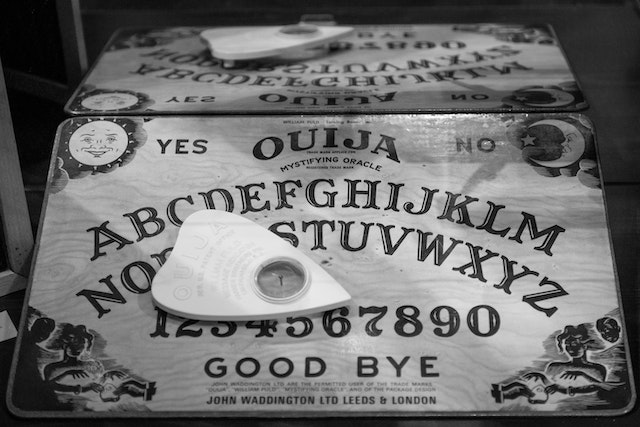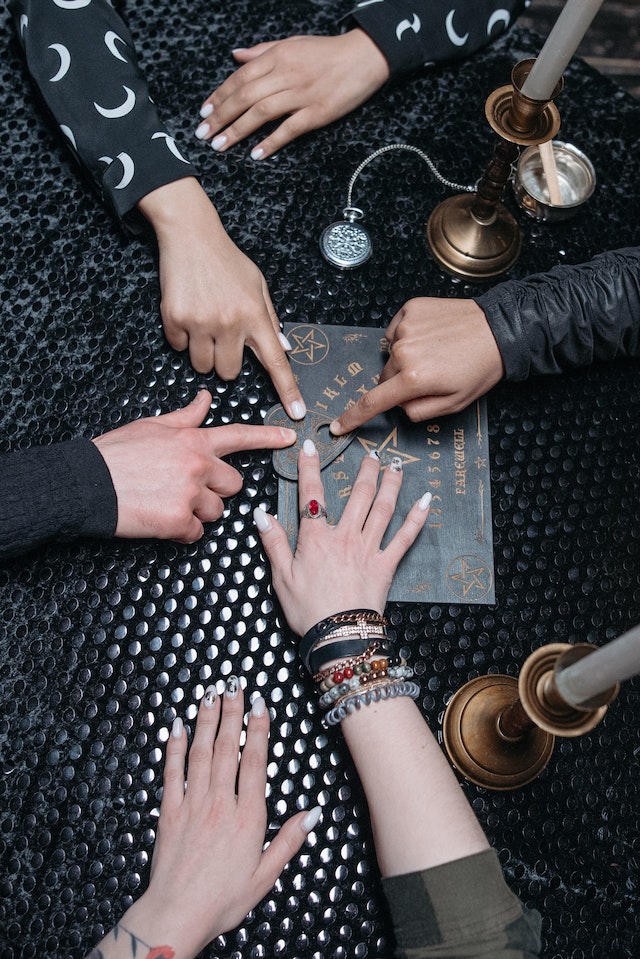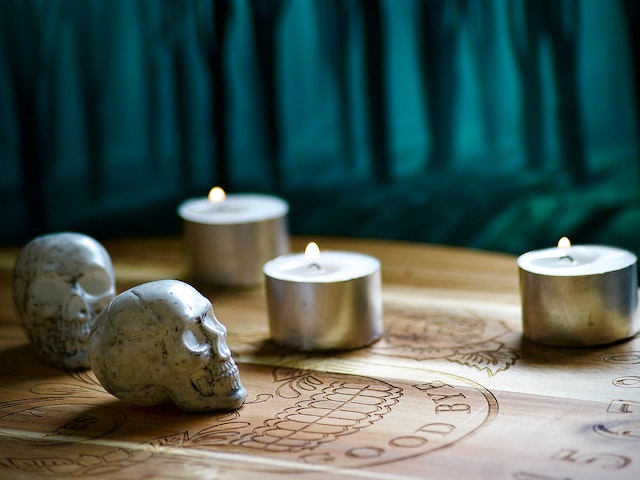The Mysterious Ouija Board
Happy Weird Wednesday! Today we’re seeking to commune with the Great Beyond— and we’re going to do it with a board game.
A Ouija board is a rectangle of wood or cardboard printed with the alphabet, the numbers 0-9 and the words yes, no, and goodbye. Players put their fingers on a triangular planchette and ask questions of the spirits, who answer by moving the planchette around the board. Of course, we know how this goes: it’s malicious entities who respond and then they kill everybody. That’s the trope. But it wasn’t always like that.
The Ouija began as a benign religious practice of Civil War-era Spiritualists, who were seeking to contact beloved family members who had died or met the more horrifying fate of vanishing into the theater of war. The board’s darker reputation began with the 1973 movie The Exorcist, which showed demonic consequences for playing.
The truth, of course, is that the planchette’s movement is caused by the ideomotor response— it’s our subconscious speaking, not spirits. Maybe not spooky, but still really cool (and okay, maybe a bit spooky). But if we’re going to seek writing prompts from beyond the veil, we need the scary stuff. So have a seat and dim the lights… let’s find out who we’re talking to.
- Call in the spirits. The Ouija board was built for necromancy: divination (seeking supernatural knowledge) from the dead. Of course, the practice of begging data from the dearly departed began long before the board came about. But the Ouija makes it easy. So let’s dial up the deceased. (Pro-tip: You can DIY a Ouija board by drawing numbers and letters on a flat surface and using an upside down glass as a planchette.) Possibilities for benign contact include loving family members who pass on reassurances about the afterlife, ghosts with info on random stuff like lottery numbers, ghosts of murder victims who wish to name their killers, or creative types who want to help you write novels (looking at you, Patience Worth). But of course, you can also phone up the fiendish: convicted killers, undiscovered killers, relatives you thought were kind who were actually killers, ghosts who like mean pranks, ghosts who just plain hate the living, and the biggest danger: dead dudes who would like to live a second life. Possession by spirits is a favorite Ouija trope, and you often get there by breaking a rule while playing the “game,” which can be anything you like: don’t play alone, don’t try to contact the very recently dead, don’t play without a piece of iron in your pocket, etc.
- Sauntering vaguely downwards. Possession by spirits is cool and all, but if you want pure evil, you’re talking demons (Good Omens aside). Designs for demons include angels who broke away from Heaven, creatures who were created corrupt, or people who sold their souls for some earthly gain. Of course, contacting a demon with a Ouija board doesn’t have to be a giant mistake: someone with the right knowledge might be able to summon and control a demon, or at least get some information (or even better, accurate information). Controlling demons could even be a morally-gray way to right the world’s wrongs.
- It’s all in your head. So what if we decide the Ouija can’t actually place calls to regions beyond? But what if it’s also not the ideomotor effect moving that planchette? Now we’re talking psychic powers. Telepathy is a common Ouija explanation: the idea that when a group asks a question, somebody there knows the answer and psychically transmits it to the group, who then moves the planchette by the usual subconscious means.
The flip side of that is telekinesis, where somebody moves the planchette using the powers of their mind, whether consciously or not. You could have a character discover their own psychic powers of either type by using a Ouija board, or they could already be adept at using their gifts. What kind of answers do they want the board to give?
- It’s just a game. Of course you can always just flat-out fake Ouija board answers. Maybe a false medium wants to console (or rip off) a grieving family, or a detective feigns contact with a murder victim in order to spur a confession from the killer. Teens at a slumber party could spill secrets or confess crushes. Or maybe a Ouija believer wants to scare others away from using the board, so they engage in a little pious fraud (or would that be impious fraud?). If you like, you can even get the planchette to move with no one touching it, using magnets or other trickery. Of course, the problem with fraud is it raises the stakes for the swindler: there’s always the possibility somebody will get wise.
Thanks for spending your Weird Wednesday here! Don’t forget to say goodbye!
Want to chat about the blog? Did you use one of the prompts? Hit me up on social media.
If you like ghostly mysteries, you can listen to my audio drama People Have to Know for free on the No Sleep Podcast. A radio reporter encounters supernatural evil during a death row interview.
Sign up for my free monthly newsletter and never miss a blog post! Or subscribe by RSS
Sources & further reading:
The Strange and Mysterious History of the Ouija Board: Smithsonian Magazine
William Fuld and Ouija Board History
How Do Ouija Boards Work? Liveabout
For more on the Civil War and Spiritualism, you can check out a book I love: This Republic of Suffering: Death and the American Civil War by Drew Gilpin Faust


